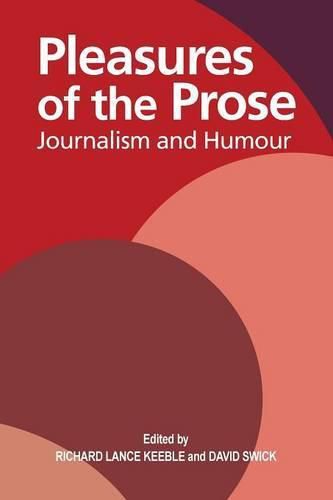Readings Newsletter
Become a Readings Member to make your shopping experience even easier.
Sign in or sign up for free!
You’re not far away from qualifying for FREE standard shipping within Australia
You’ve qualified for FREE standard shipping within Australia
The cart is loading…






This title is printed to order. This book may have been self-published. If so, we cannot guarantee the quality of the content. In the main most books will have gone through the editing process however some may not. We therefore suggest that you be aware of this before ordering this book. If in doubt check either the author or publisher’s details as we are unable to accept any returns unless they are faulty. Please contact us if you have any questions.
Humour, so much a part of everyday communication and the pleasure of media consumption, has been strangely marginalised in journalism/communication studies. This innovative volume, edited by Richard Lance Keeble and David Swick, at last puts the focus on the funniest pages with studies of print and online journalism in a wide range of countries: Brazil, Britain, Spain, Mexico, the Philippines and the United States of America. Separate sections look at ‘Humour in Journalism, Yesterday and Today’, ‘The Witty Ways of Literary Journalists’ and ‘The Politics of Being Funny’. Topics include: - George Orwell’s Humour. - Humour in the First Decades at the New Yorker. - The Idiosyncratic, Witty Journalism of ‘Revolutionary’ Russell Brand. - Humour in Mexican Illicit Drug Trade-Related Cronicas. - The Role of the Satirical Press during the Spanish Civil War. - Millor Fernandes’s Legacy and the Role of Humour in Brazilian Journalism. The contributors include Amy Forbes; Josep Lluis Gomez-Mompart, with Dolors Palau-Sampio, Jose Luis Valhondo-Crego and Maria Iranzo-Cabrera; Nicolas Llano Linares; Rhiannon McGlade; Sarah Niblock; Novia D. Pagone; Carolyn Rickett; Mathilde Roza; Miki Tanikawa; Ave Ungro and Garry Whannel. Students and teachers in journalism, communication studies, humour studies, sports media, computer studies and media history will all find something fascinating in this text.
$9.00 standard shipping within Australia
FREE standard shipping within Australia for orders over $100.00
Express & International shipping calculated at checkout
This title is printed to order. This book may have been self-published. If so, we cannot guarantee the quality of the content. In the main most books will have gone through the editing process however some may not. We therefore suggest that you be aware of this before ordering this book. If in doubt check either the author or publisher’s details as we are unable to accept any returns unless they are faulty. Please contact us if you have any questions.
Humour, so much a part of everyday communication and the pleasure of media consumption, has been strangely marginalised in journalism/communication studies. This innovative volume, edited by Richard Lance Keeble and David Swick, at last puts the focus on the funniest pages with studies of print and online journalism in a wide range of countries: Brazil, Britain, Spain, Mexico, the Philippines and the United States of America. Separate sections look at ‘Humour in Journalism, Yesterday and Today’, ‘The Witty Ways of Literary Journalists’ and ‘The Politics of Being Funny’. Topics include: - George Orwell’s Humour. - Humour in the First Decades at the New Yorker. - The Idiosyncratic, Witty Journalism of ‘Revolutionary’ Russell Brand. - Humour in Mexican Illicit Drug Trade-Related Cronicas. - The Role of the Satirical Press during the Spanish Civil War. - Millor Fernandes’s Legacy and the Role of Humour in Brazilian Journalism. The contributors include Amy Forbes; Josep Lluis Gomez-Mompart, with Dolors Palau-Sampio, Jose Luis Valhondo-Crego and Maria Iranzo-Cabrera; Nicolas Llano Linares; Rhiannon McGlade; Sarah Niblock; Novia D. Pagone; Carolyn Rickett; Mathilde Roza; Miki Tanikawa; Ave Ungro and Garry Whannel. Students and teachers in journalism, communication studies, humour studies, sports media, computer studies and media history will all find something fascinating in this text.